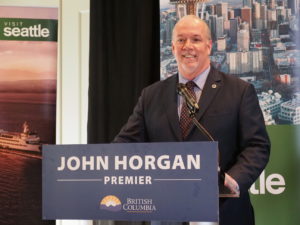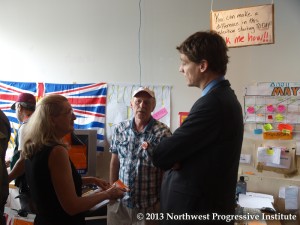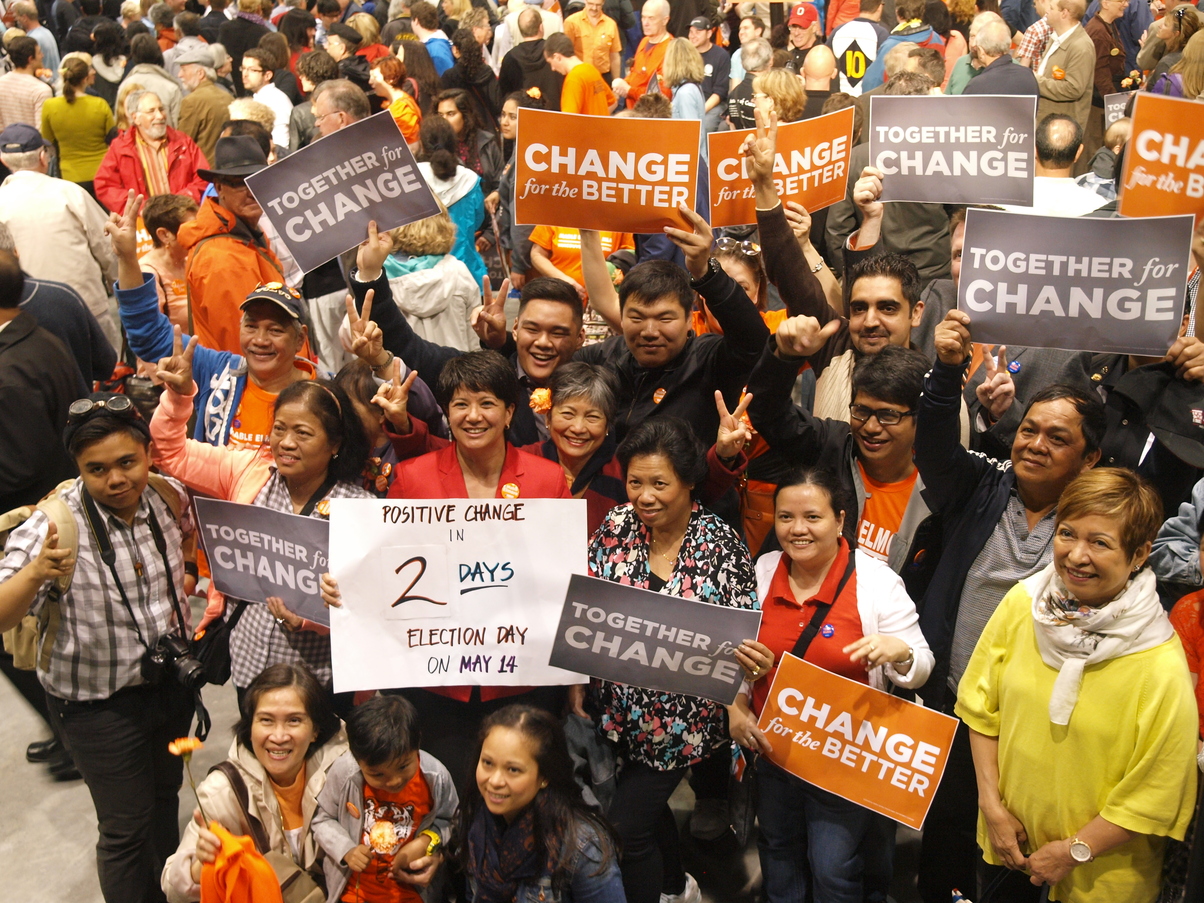A full head transplant is the most challenging political operation performed in a parliamentary system of government, one in which a party can execute a smooth transition in power or come apart and doom itself in the next election..
The left-leaning New Democratic Party in British Columbia faces a leadership contest after popular B.C. Premier John Horgan announced that he is leaving the job he has held four five years and will not run for the Legislative Assembly of B.C. in the next provincial election. Horgan, sixty-three, has come through a bout with throat cancer but decided that he doesn’t have the energy or reserves for a multi-year commitment to the jobs of party leader and Premier.

Long in opposition, the New Democrats used to be a party aligned with organized labor, with a base on Vancouver Island and in coastal pulp mill towns.
The party has expanded that base under Horgan’s leadership.
The NDP has won legislative seats on the North Shore above Vancouver, in the Fraser Valley and in suburban Richmond.
The party has a “bench” of capable Cabinet ministers to contest its upcoming leadership contest – party members will select the premier’s successor – but must put in place a premier who will connect with voters in the fashion of the avuncular, accessible Horgan.
The province’s free enterprise coalition, once the Social Credit Party and now the (not very liberal) Liberals, have a history of come-from-behind election victories.
A look at the front bench: The crown has put a lot of weight on the shoulders of David Eby. Eby, forty-four, is Attorney General and Housing Minister. He was once director of the B.C. Civil Liberties Association.
Eby entered politics in 2013 by upsetting then-Premier Christy Clark in her home riding (the Canadian term for a district) of Vancouver-Point Grey. (Clark had to go through a by-election in the Okanagan to get back in the Assembly.)

Eby is everywhere. He has cleaned up a management mess in the Insurance Corporation of British Columbia, offered rebates to ICBC customers and moved the province toward no-fault auto insurance.
He has reformed election financing, evening a playing field long dominated by corporate Vancouver. He launched an investigation into use of British Columbia for money laundering through the province’s casinos.
British Columbia recently took the lead among Canada’s province’s in securing a $150 million (Canadian) settlement – “the largest settlement of its kind in Canadian history,” in Eby’s words – with Purdue Pharma Canada over its manufacture and promotion of the opioid-based pain medication Oxycontin. Opioids, especially fentanyl, kill more people in British Columbia than anyplace else in Canada.
Bowinn Ma, thirty-six, the province’s youngest legislator, is very different from NDP members who once rose on the floor of the Legislature to denounce tax breaks given big business, shouting: “The hogs are at the trough!” She is an engineer, a former project manager at Vancouver International Airport. She is a backer of the #MeToo movement who used the floor of the B.C. Legislature to take a cross-border shot at U.S. Supreme Court nominee Brett Kavanaugh.
Ma scored a 2017 breakthrough for New Democrats on the North Shore, capturing the North Vancouver-Lonsdale riding.
In 2020 she became Minister of State for Infrastructure. Coming from a riding with patience-straining commutes across Burrard Inlet, she is responsible for upgrades badly needed in population centers constrained by geography.
Specifically, Ma’s portfolio includes expansion of TransLink Skytrain, rapid bus service from the North Shore into Vancouver, the Massey Tunnel project (due for completion in 2030) and rebuilding of the aging Pattullo Bridge over the Fraser River at New Westminster.
British Columbia has had two women serve as premier, each from the free enterprise side of the political fence. Both lost elections, although Christy Clark has gone on to reap the rewards of corporate directorships.
Nathan Cullen, forty-nine, was named earlier this year as Minister of Municipal Affairs. He is from the far-north riding of Stikine, having previously represented the northwest corner of British Columbia for fifteen years in Canada’s House of Commons. A week short of his fiftieth birthday, Cullen has been a promising young man in Canadian politicians in three different decades.
Washington State has often sent its best political talent to Washington, D.C., although Mike Lowry and Jay Inslee did come home to win elections as governor. In Canada, the New Democrats usually capture twenty-five to thirty seats in the three hundred and eighty-eight member federal parliament.
British Columbia is a province where they can (occasionally) govern.
Cullen has worked as a mediator between the British Columbia government and Aboriginal First Nations hereditary chiefs of the Wet’suwet’em people, who have vehemently opposed the Coastal Gas Link pipeline that will transport liquid natural gas to an export port at Kitimat.
The Horgan government has faced sit-ins along the pipeline route.
The New Democrats are a party of labor, but also home to Aboriginal First Nations and environmental activists. Horgan has gone through a tricky balancing act. He reluctantly gave a go-ahead to the $8 billion (and rising) Site C dam on the Peace River, a project launched under Christy Clark. The government has, however, held up logging of old growth forests.
More than 1,100 people have been arrested at one logging site on lower Vancouver Island. The New Democrats tried but were unable to stop the Canadian federal government from pushing forward with the TransMountain Pipeline expansion, which will carry up to 890,000 barrels of oil a day to an export terminal at Burnaby, just east of Vancouver.
One potential contender, Ravi Kahlon, has bowed out.
Kahlon, forty-three, played on Canada’s field hockey team in the 2000 and 2008 Olympic Games, and took the “swing” riding of Delta North from the Liberals in the 2017 provincial election. He mounted a model volunteer campaign in a constituency that hugs the south bank of the Fraser River.
Kahlon did the grunt work of government under Horgan, serving as parliamentary secretary in a pair of Cabinet ministries, and point man for the New Democrats’ plan for a new tunnel to replace the aging, overcrowded George Massey Tunnel under the Fraser River. The tunnel is a major route into Canada’s Vancouver from White Rock, Delta and Surrey.
The reward came after the New Democrats’ 2020 election victory: Kahlon was given the job of Minister of Jobs, Economic Recovery and Innovation, given the job of overseeing B.C.’s recovery from the COVID-19 pandemic.
This morning, however, Kahlon decided not to enter the leadership race, saying he would support Eby instead. Eby has yet to officially declare his candidacy, but getting Kahlon’s support is big, as Kahlon might have been his biggest rival.
“Hard to see anyone else beating Eby,” tweeted Global’s Keith Baldrey.
The New Democrats’ leadership race will see climate, resource and environmental issues at play. Of greatest import, however, who will be the face of the party as it tries to hold power? Who will face off with new Liberal Party leader Kevin Falcon on the floor of the Legislature? Who will project an ability to govern one of the Earth’s gorgeous places? The answer will play a big role in the BCNDP’s future.

